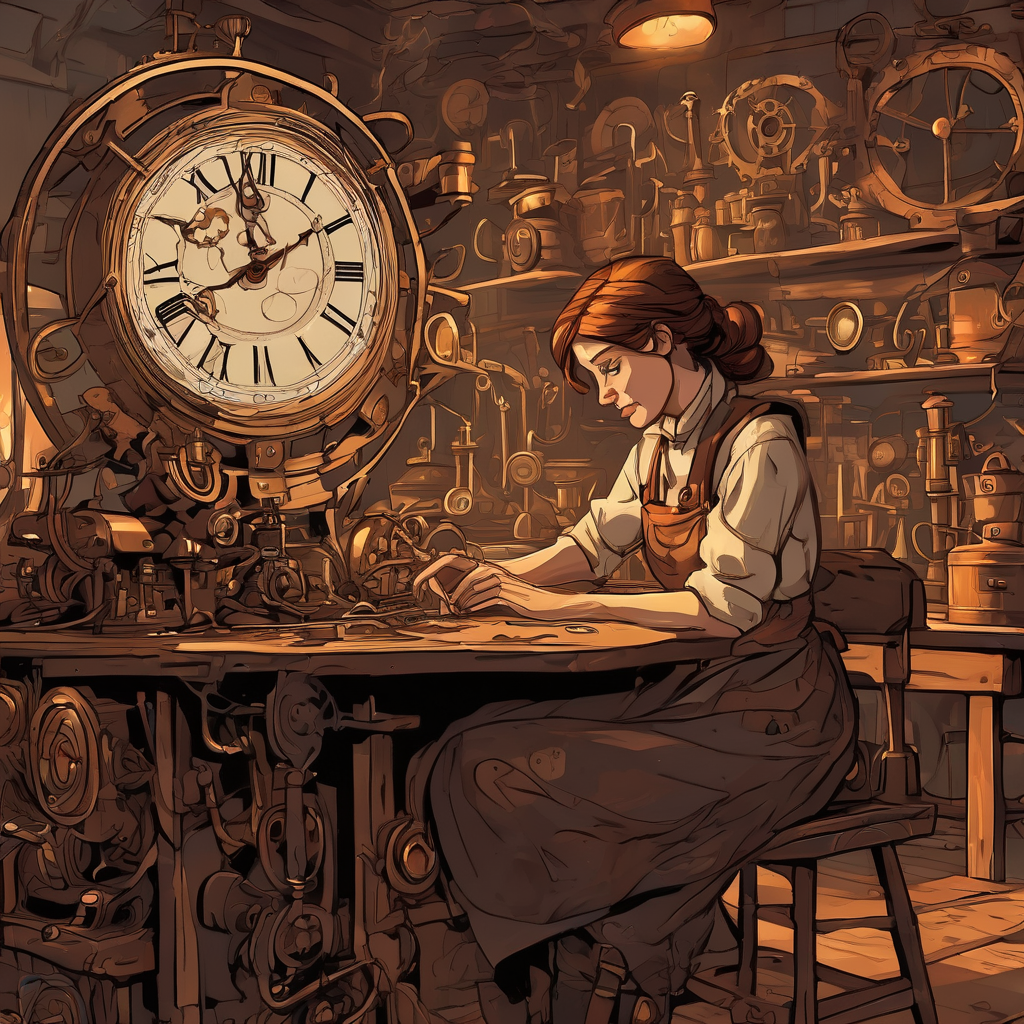The brass gears whispered secrets as Celeste wound the mainspring of her father’s last creation—a pocket watch that ticked backwards. Outside, the city streets filled with protesters demanding climate justice, their chants mixing with the mechanical symphony of the workshop. She’d inherited more than timepieces when her father vanished; she’d inherited his obsession with temporal sustainability.
Marcus arrived at noon, though he couldn’t remember making the appointment. These days, he couldn’t remember anything that hadn’t happened yet. The doctors called it prophetic amnesia, a rare condition where the mind rejected future memories. Yesterday, he’d known he would win the lottery. Today, he held the ticket but couldn’t recall what numbers to play.
“You’re the clockmaker’s daughter,” he said, studying her oil-stained fingers as they danced across the workbench.
“And you’re the man who reads newspapers before they’re printed,” Celeste replied, not looking up. “Or used to.”
The backwards watch pulsed in her palm like a caught bird. Her father had theorized that time moved like fashion trends—circular, recursive, always returning transformed. The sustainability movement wasn’t just about preserving the future; it was about healing the past.
Marcus picked up a half-assembled chronometer, its exposed mechanics reminding him of something he’d forgotten to remember. “Your father contacted me six months from now. He’ll tell me you have something I need.”
“Had,” Celeste corrected. “He had something. Before he stepped sideways through Thursday and never came back.”
She opened a drawer filled with cryptocurrency keys etched on metal gears—her father’s way of hiding wealth in plain sight. The economy had shifted, values fluctuating like heartbeats, but these mechanical treasures held steady worth in their craftsmanship alone.
“I dream of tomorrow,” Marcus said suddenly, “but wake up forgetting. Like trying to hold water in a sieve.”
Celeste finally met his eyes. They were the color of rust on copper, oxidized by time. “My father believed some people were born with their internal clocks wound wrong. You’re not forgetting tomorrow—you’re remembering it backwards.”
She handed him the reverse-ticking watch. The moment it touched his skin, his eyes widened. The next day’s lottery numbers blazed through his mind like neon. The protest that would succeed. The rain that would fall upwards at three-fifteen. The kiss that would happen in this very shop, tasting of machine oil and possibility.
“How?” he whispered.
“Sustainability isn’t just about resources,” Celeste said, moving closer. “It’s about time itself. Making sure we don’t spend tomorrow before we’ve earned it. My father discovered that some of us are temporal investors, others temporal debtors. You’ve been borrowing from your future, and now the interest has come due.”
The backwards watch synchronized with Marcus’s heartbeat, and suddenly he could hold tomorrow without it slipping away. He saw Celeste’s father, not vanished but dispersed across moments, maintaining the great clockwork of cause and effect. He saw the climate protesters succeeding because someone would remember to tell them which words would move the unmovable. He saw himself, no longer forgetting but finally, truly remembering.
“What happens now?” Marcus asked, though for the first time in months, he already knew the answer.
Celeste smiled, winding another mainspring. “Now we fix time itself. One second at a time, backwards and forwards, until the world’s clock runs clean again.”
Outside, the protesters cheered as news broke of a breakthrough—someone had leaked tomorrow’s headlines today, showing a future worth fighting for. In the workshop, surrounded by the eternal ticking of countless timepieces, the clockmaker’s daughter and the man who forgot tomorrow began their work of remembering everything that hadn’t happened yet, and forgetting everything that never should.

Leave a Reply